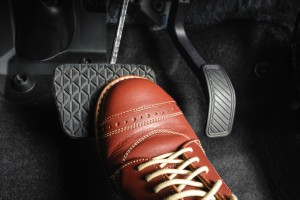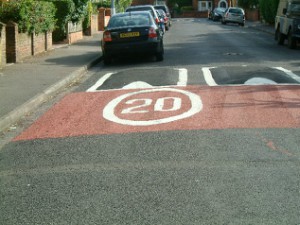We all have our bad habits when it comes to driving, but were you aware of the damage it can do to your car? We’ve put together the most common habits that you need to stay clear of or stop - we believe this could save you a lot of money in unnecessary repair costs.
 Dragging the brakes downhill By continuing to drag your brakes, this will add increased wear and tear on brake pads and discs. Therefore, this will incur an unnecessarily-increased expense to your driving, as you’ll need to replace them more frequently.
Dragging the brakes downhill By continuing to drag your brakes, this will add increased wear and tear on brake pads and discs. Therefore, this will incur an unnecessarily-increased expense to your driving, as you’ll need to replace them more frequently.So, the correct way of travelling downhill, is by engaging in a lower gear and applying light braking, and then releasing the pedal to allow the brakes to cool. Although only apply the brakes when required.
Resting your hand on the gearstick We were all angels with our driving instructors in the car with us, making sure we kept both hands on the steering wheel. However, as soon as you passed and threw off the ‘L’ plate, things changed, didn’t they? Bad habits occurred, like resting your hand on the gear stick. Did you know this can be bad for the transmission?
As most petrol-heads will know, the gearstick is connected to a selector fork – this is designed to make contact with a rotating collar for a short amount of time. If you were to rest your hand on the gearstick, you risk applying pressure to the selector fork, causing premature wear.
Flooring the accelerator in a high gear Nowadays, modern cars have a special feature of a gearshift indicator light, so showing you when it’s the right time to change up or down a gear.
Accelerating at low rpm (revolutions per minute), or in too high a gear, will cause the engine to work harder than necessary, inflicting strain onto the motor. Therefore, it is important to change down and allow the revs to rise before changing up – this being essential when carrying heavy loads or when climbing hills.
Overloading your vehicle The owner manual that you receive with your car will tell you what its maximum load weight is, this gives you an indication of how much luggage you should carry as a total.
By overloading your car (although most modern-day cars have been designed to carry heavy loads), the greater the weight, the more strain you’re placing on the brakes, suspension and drivetrain. Even by just leaving unnecessary items in your car can affect its fuel economy and possibly the emissions output too.
The advice we give you is to travel as lightly as possible to be efficient.
Shifting from drive to reverse before stopping For both an automatic and manual car, this is considered bad for the transmission.
For an automatic, they are designed to shift gears, so you leave the brakes to do the stopping. When shifting gear before coming to a complete stop, this can cause wear and tear on the transmission band, rather than the brake discs and pads, which are serviceable items. By causing damage to this type of transmission can be labour intensive, so will result in a costly bill.
By crunching the gears in a manual car too, it is advisable to stop before switching in to reverse gear.
As most petrol-heads will know, the gearstick is connected to a selector fork – this is designed to make contact with a rotating collar for a short amount of time. If you were to rest your hand on the gearstick, you risk applying pressure to the selector fork, causing premature wear.
Flooring the accelerator in a high gear Nowadays, modern cars have a special feature of a gearshift indicator light, so showing you when it’s the right time to change up or down a gear.
Accelerating at low rpm (revolutions per minute), or in too high a gear, will cause the engine to work harder than necessary, inflicting strain onto the motor. Therefore, it is important to change down and allow the revs to rise before changing up – this being essential when carrying heavy loads or when climbing hills.
Overloading your vehicle The owner manual that you receive with your car will tell you what its maximum load weight is, this gives you an indication of how much luggage you should carry as a total.
By overloading your car (although most modern-day cars have been designed to carry heavy loads), the greater the weight, the more strain you’re placing on the brakes, suspension and drivetrain. Even by just leaving unnecessary items in your car can affect its fuel economy and possibly the emissions output too.
The advice we give you is to travel as lightly as possible to be efficient.
Shifting from drive to reverse before stopping For both an automatic and manual car, this is considered bad for the transmission.
For an automatic, they are designed to shift gears, so you leave the brakes to do the stopping. When shifting gear before coming to a complete stop, this can cause wear and tear on the transmission band, rather than the brake discs and pads, which are serviceable items. By causing damage to this type of transmission can be labour intensive, so will result in a costly bill.
By crunching the gears in a manual car too, it is advisable to stop before switching in to reverse gear.
 Hitting potholes and speed bumps Researchers have estimated that a third of all vehicle damage is due to pothole damage, this is because the impact can cause buckled wheels, lumps in the tyre and cracked alloys, as well as upsetting the tracking and wheel balancing. Therefore, it is best to avoid them at all costs.
Hitting potholes and speed bumps Researchers have estimated that a third of all vehicle damage is due to pothole damage, this is because the impact can cause buckled wheels, lumps in the tyre and cracked alloys, as well as upsetting the tracking and wheel balancing. Therefore, it is best to avoid them at all costs.Similarly, driving over a speed bump at high speeds can cause damage to the front and rear of the car, the underside, and potentially the exhaust system. To avoid this damage, stick to a slow speed when approaching these bumps in the future.
Neglecting warning lights We all have that awful feeling in your stomach when you see a warning light flash up on our dashboard, but this doesn’t mean to avoid it at all costs.
Our advice to you is to become educated with the warning lights on your dashboard and know which ones to address immediately when driving. Here are the following warnings we advise you to stop and seek help from:
Revving the engine when cold Many may tell you that making regular short journeys isn’t the best thing for your car, due to the engine oil never completely warming up. Although all vehicles start from cold, so the critical thing is to avoid revving the engine until it is warmed up.
The idea behind this is to ensure this gives the oil enough time to warm and circulate around the engine, avoiding potential damage and undue wear and tear.
Riding the clutch This habit is an extremely bad idea, due to the clutch being considered a ‘wear and tear’ item, therefore it’s not covered by warranty. The occurrence of riding the clutch happens typically when a driver fails to take their foot off the pedal after changing gear, or when attempting to do a hill-start.
It is important to have good clutch control because if you don’t, this can cause excessive wear and shorten the life of the plate. We advise making sure your foot has left the clutch pedal – using the off-clutch footrest if fitted. Also, when performing hill-starts, leave the car in neutral with the handbrake on until you’re ready to move.
Our advice to you is to become educated with the warning lights on your dashboard and know which ones to address immediately when driving. Here are the following warnings we advise you to stop and seek help from:
- Engine/ECU
- Braking system
- Power steering failure
- Airbag
- Oil pressure
- Cooling system
Revving the engine when cold Many may tell you that making regular short journeys isn’t the best thing for your car, due to the engine oil never completely warming up. Although all vehicles start from cold, so the critical thing is to avoid revving the engine until it is warmed up.
The idea behind this is to ensure this gives the oil enough time to warm and circulate around the engine, avoiding potential damage and undue wear and tear.
Riding the clutch This habit is an extremely bad idea, due to the clutch being considered a ‘wear and tear’ item, therefore it’s not covered by warranty. The occurrence of riding the clutch happens typically when a driver fails to take their foot off the pedal after changing gear, or when attempting to do a hill-start.
It is important to have good clutch control because if you don’t, this can cause excessive wear and shorten the life of the plate. We advise making sure your foot has left the clutch pedal – using the off-clutch footrest if fitted. Also, when performing hill-starts, leave the car in neutral with the handbrake on until you’re ready to move.
 Late braking In times of an emergency where you need to come to a sudden stop, then it is essential for sudden braking. However, consistent late braking will place more strain on the braking system, wearing out your pads and discs faster, as well as cost you more fuel in the process.
Late braking In times of an emergency where you need to come to a sudden stop, then it is essential for sudden braking. However, consistent late braking will place more strain on the braking system, wearing out your pads and discs faster, as well as cost you more fuel in the process.To look after your car better in general, a slow and considered approach is the best thing you can do by anticipating the road ahead and looking around for any potential risks.
We think it’s important to leave these bad habits in 2017 and learn how to take care of your car properly in just the simplest of ways.
For more CarCliq guides click here
For more CarCliq guides click here